Rachel Neumeier's Blog, page 296
July 19, 2016
Sometimes the answer is simpler than it seems
At Lit Hub, an interesting post: Why do we write about orphans so much?
I could ascribe it, I suppose, to a sort of Generalized Anxiety Disorder … What, after all, is the worst fate a child can imagine? The loss of her parents is up there. And my current artistic interest in orphan characters may just be a relic of that time. I sometimes think that everything that inspires me to write was cemented for me by age thirteen.
Plausible, I guess, for this particular author (Liz Moore). But naturally there is a more general answer to this question as well:
The orphan character—especially one who is an orphan before the novel begins—comes with a built-in problem, which leads to built-in conflict.
Yep! Built-in problem. That is the big reason a lot of us write about orphans, I’m sure. I mean, in The Floating Islands, losing his parents was the impetus for Trei making that long uncertain trek south to find his mother’s kin. Same for Black Dog. That kind of thing happens a lot, obviously.
Of course an author can also go for a horrible, toxic parent-child relationship as the main source of conflict and tension, but I would personally find that really unpleasant to write, so it’s not likely to be a main focus in any of my stories.
But even the idea of instant tension and conflict misses a very simple, practical, virtually universal factor that I suspect is the other main reason underlying a frequent dearth of parents in MG and YA fiction:
If your main character has two living parents, you as the author have two more characters to deal with. If your protagonist’s friends have intact families as well, secondary characters can multiply rapidly. It is just easier — practically speaking — to reduce the crowd up front. By killing off the parents, as an added plus, you then get the built-in problems that go with that. Given that basic truth, it’s a wonder any children in fiction have living parents. Let me see, how many of my own protagonists have two living parents when the story opens? . . . In Islands, Ariane, but of course she was orphaned later on. Tehre! There’s one. One. I think just one. And that is not a YA novel, either.
Yep, my younger protagonists certainly do tend to have parents who are either dead when the story opens, or die during the course of the story. This definitely has nothing to do with the kind of personal childhood worry about the potential for losing parents that Liz Moore describes in her post. It is driven primarily by plot considerations and secondarily by the convenience of reducing the number of secondary characters.
On the other hand, I do love well-drawn, loving, competent parents, on the rare occasions where a fictional protagonist is lucky enough to have them. I can’t think of very many YA protagonists who actually have both their parents meet that description. Miles Vorkosigan, if you’d count that series as YA-ish for at least some of the books. Anybody else? Lots of MG / YA protagonists do manage to hang onto one great parent, but two?
Okay, got one. Nita in So You Want to be a Wizard. Her parents are pretty oblivious at the beginning of the series, but they eventually get clued in. I don’t know that they ever played a huge role, but they are loving and supportive and not (as I recall) incompetent.
Can anybody else think of an instance?

July 18, 2016
One more list: Fantasy novels that aren’t as well known as they should be
From /r/Fantasy, a user-friendly Wiki for underread fantasy titles. There are quite a few titles I would have voted for on this list . . . let me see . . .
All right, Sherwood Smith’s INDA got quite a few votes, and all of a sudden it seems like I can’t turn around without hearing about TO RIDE HELL’S CHASM by Janny Wurts.
And there are a couple by Martha Wells. Yep, she’s definitely an author who deserves to be far better known than she is.
I do notice OD MAGIC is on here, which may fit the criteria of the list (under 3000 ratings), but really, anything by Patricia McKillip is probably not so very far under the radar. I would say the same for anything by CJ Cherryh. Underread in the sense that everybody and their cousin ought to be reading them, but the authors are certainly well known.
And hey, there’s HOUSE OF SHADOWS! Thank you, whoever you are who voted for it.
Anyway, it’s a handy list where, if you hover over the title, you get a pop-up summary. Clicking on a title takes you to the Goodreads entry. That’s very handy and makes this a fun list to browse through.

July 15, 2016
Music and Moving Paint: Disney’s Fantasia
I’m sure I’m not the only one who has very fond memories of the original Fantasia. Over at tor.com, Mari Ness has posted one of her nostalgia-inducing posts, this one (as you might imagine) about Fantasia.
Perhaps more than any other film discussed in this Read-Watch/Watch-Watch, Fantasia was a labor of pure love, a lavishly animated work of over one thousand artists, technicians and musicians. In making it, Walt Disney was determined to prove that animation could be more than just silly cartoons: it could also be high art. High art that included, not always successfully, dinosaurs, centaurs, elephant ballerinas, and terrifying demons. The result was a strange yet almost always beautiful film, arguably the studio’s greatest accomplishment, and certainly its greatest technical accomplishment until the advent of the CAPS system and computer animation in the 1990s.
I’m not into the technology of special effects enough to just automatically remember how primitive the equipment was when animators were making Fantasia, as opposed to when they’re making movies today. Given what people had to work with in 1940, isn’t it fair to say that Fantasia is still Disney’s greatest technical accomplishment?
It turns out that Fantasia received some mixed reviews . . . from music critics:
If Stokowski lost control over the final music selection, he still retained responsibility for the final orchestration and scoring. He also directed the Philadelphia Orchestra in performance … His interpretations failed to win universal approval, with music critics particularly decrying the butchered versions of The Nutcracker Suite and Beethoven’s Pastoral Symphony. A few critics also complained about the decision to have Schubert’s Ave Maria sung in English instead of Latin or German. Others were distressed by the decision—made by Stokowski, not Disney—to use an orchestral version of Johann Sebastian Bach’s Toccata and Fugue, originally scored, according to most scholars, for organ. The idea was not entirely new: Stokowski, who apparently had some doubts about that scoring, had created and recorded an orchestral version years before.
Well, gosh, sorry about that butchered version of The Nutcracker Suite. I, as a mere child at the time, loved the Nutcracker as presented in Fantasia. Also the Ave Maria. Since I would hardly have gone out of my way to listen to any kind of classical music when I was a tot, I wonder if the music critics might have done better to cut Stokowski a break.
However, I do find myself remembering the parts of Fantasia I particularly loved — the fairies spreading frost across the world, the dancing fish with the trailing fins, the pegasi and centaurs (I admit the little cupids struck me as twee even when I was much younger), Night on Bald Mountain followed by Ave Maria — and simply forgetting about the sections I didn’t much care for — the dinosaurs marching off on their uber-depressing death march (and that was before I knew how incorrect the dinosaurs were), the silly hippo-and-ostrich thing, and the Sorcerer’s Apprentice, which (sorry) I always disliked.
Anyway, as always, Mari Ness does a great job making me look back on a childhood favorite with a new and broader view. Click through if you want to read the whole thing.

July 14, 2016
Maybe it’s time for some historical perspective
Here’s an interesting post at The Passive Guy: The “Big Change” era in trade book publishing ended about four years ago. It starts with an extensive quote from veteran publishing consultant Mike Shatzkin:
…as publishers, retailers, libraries, and their ecosystem partners prepare for whatever is next, it becomes increasingly evident that — from the perspective of trade publishing at least — we have already lived through the biggest period of transition. It took place from sometime in 2007 through 2012. … At the beginning of 2007, there was no Kindle. By the end of 2011, there was no Borders.
Yep, big changes, all right. No one is going to disagree with that part. Shatzkin goes on:
[T]he challenges of today aren’t about change of the magnitude that was being coped with in the period that ended five years ago. They’re more about improving workflows and processes, learning to use new tools, and integrating new people with new skill sets into the publishing business. … It isn’t that there aren’t still many of new things to work on, new opportunities to explore, or long-term decisions to make. But the editor today can sign a book and expect a publishing environment when it comes out in a year or two roughly like the one we have today. The editor in 2010 couldn’t feel that confidence.
This seems plausible to me, but I see The Passive Guy thinks this is a bunch of hooey:
Unfortunately, the predictions in the OP represent a typical pattern of thinking in an industry swept up by disruptive technology. The survivors of early changes think, “It’s going to stop now. Nothing happened to me last year or last month, so nothing will happen to me next month and next year.”
PG doesn’t think this is the case for Big Publishing and its ecosystem.
Why? Big Publishing is simply too expensive. It costs everyone too much.
And I must say, that seems plausible, too. Among other things, The Passive Guy points to the high ebook prices we’re seeing from the Big Five publishers . . . I will add here, not from Saga! Which, yay! has the basic economic sense to think that possibly price might affect sales. But it’s certainly true that we see very, very high ebook prices for a lot of authors when there is no obvious reason to think that readers are willing to pay that much. I don’t mean the newest from Lois McMaster Bujold or Ilona Andrews. Lots of readers ARE willing to pay a lot for their new releases, obviously. But I see, for example, that Too Like the Lightning, Ada Palmer’s debut SF novel which just came out, is offered for $12.99 (Tor). That’s quite a price to hang on a debut novel. In contrast, Dark Run, a debut SF novel from Mike Brooks (Saga), is available for $7.99 — still higher than some readers will pay, but I’m sure far less off-putting than a price tag above $10.
While I looked for debut novel prices of recent releases, I noticed that Roses and Rot, Kat Howard’s debut novel from Saga, is $1.99 today. I haven’t read it, so this isn’t actually a recommendation as such, but if you were thinking of picking it up, I bet you find that more appealing than $12.99.

July 13, 2016
Just how impressive is YOUR English vocabulary?
Via File 770’s roundup of links for the day, in the number (11) spot, we find that:
1. Vox Day cited an online vocabulary test as evidence of his brains, reporting a score of 30150
2. Mike Glyer naturally zipped off to take the same quiz (hey, could *you* resist?) and also got a score of 30150
3. I couldn’t resist either, so I can tell you that apparently the top score is 30325, because that’s the score I got and according to Glyer, he and Vox Day only missed one, so I guess I got them all.
I’m sure you are now curious about this quiz, so here it is. It’s a synonym/antonym test that starts off super easy and does not, in my opinion, get very difficult. There are fifty items. I will add that I only knew “avulse” because of a knack for remembering medical terms. And a stronger knack for taxonomy, but one rarely encounters “Perissodactyla” on a vocabulary quiz, so that wasn’t useful here.
Anyway, enjoy!

July 12, 2016
Cover art: Barrayar
So, I saw this post at tor.com, featuring a re-read of Barrayar, plus a cover for the book I haven’t seen before:
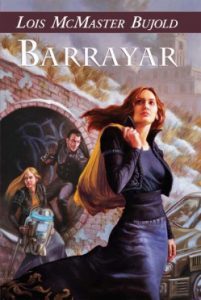
… and I thought, Can it be that a Vorkosigan book by Lois McMaster Bujold got a good cover? Is that even possible?
But I do think this is pretty good! Cordelia is maybe a little young-seeming, but still. I like the bag she has over her shoulder, and I like the scene itself, and generally I just like this cover. So I thought it would be interesting to compare it to what turns out to be a whole lot of other covers that have adorned Barrayar over the years.
Here’s the cover of my copy:
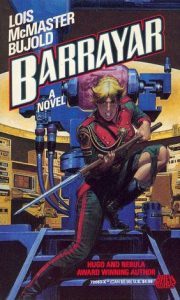
I never understood this cover. Is that supposed to be Cordelia? Surely not? But what is Drou doing on the cover, in a weird scene that I don’t think ever took place?
Let’s take a look at some more, which I think range from boring (generic spaceship cover) through just weird (that white one) and possibly okay but misleading (the swordstick raised up to strike) and oddly pensive but not actually bad. What do you think? My vote for best of the lot is the first one, the one I saw at tor.com. My vote for the worst is the one on my own copy, the strange blond woman with the sword stick. Or maybe the white one, which has totally the wrong feel for the genre as well as being wrong for the actual book.
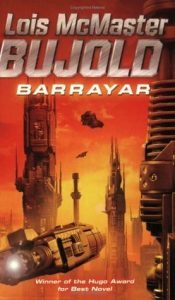
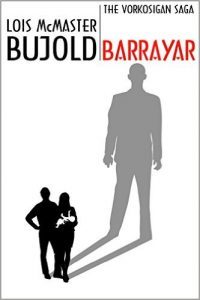
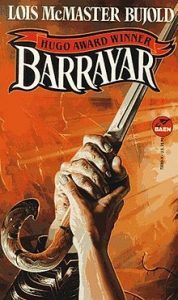
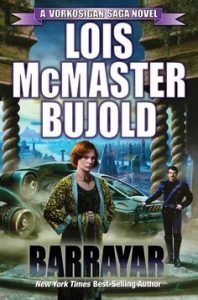

July 11, 2016
Book Riot: Seven Standalone Fantasy Novels
So, over the weekend I happened to notice a post at Book Riot: Seven Standalone Novels for Fantasy Lovers. And I clicked through, after which two thoughts occurred to me: (a) Some darn good novels on this list, and (b) You couldn’t even get to ten, seriously?
Because yes, yes, there are a LOT of fantasy series out there, as we have perhaps all noticed. Which is great! I love series, and while I won’t quite say the longer the better, I will note that I am still cheerfully buying Foreigner novels and Vlad Taltos novels as quickly as they come out. But there is not exactly a dire shortage of standalones if you think about it.
I definitely am more willing to pick up a standalone novel when I don’t have time for a whole series, or certainly when I want to try a new-to-me author, and surely plenty of people feel the same way. So I took a few minutes and blew the list of seven standalone fantasy titles up to a nice even fifty. I tried to include books I really love (but I did include a handful I haven’t even read but that are on my TBR pile).
First, here are the seven titles included on the Book Riot Post. I’ve read only three, but I really loved all three and keep meaning to read more by Karen Lord. Anyway, here we go:
1. Uprooted by Novik
2. Redemption in Indigo by Karen Lord
3. The Sorcerer of the Wildeeps by Kai Ashante Wilson
4. The Goblin Emperor by Katherine Addison
5. The Ballad of Black Tom by Victor LaValle
6. The Ghost Bride by Yangsze Choo
7. The Night Circus by Erin Morgenstern
And now here are 43 more standalone titles, to bring the total to fifty. I drew quite freely on older titles, and you will probably notice that I included more than one title by specific authors if they happen to be great writers who specialize in standalones. A few I haven’t read; those are mostly on my TBR pile. Also, there are no SF titles here – strictly fantasy. Also, yes, I included my own standalone titles. If you don’t see one of my titles on here that looks at the moment like a standalone, that’s because there will definitely be a sequel someday, even though I may not know just when it will appear.
Now, my handy expanded list, for those looking for standalone fantasy novels:
8. Watership Down by Richard Adams. Is this a fantasy? There’s no magic . . . but it’s such a great book. And it totally stands alone!
9. The Last Unicorn by Beagle
10. The Innkeeper’s Song by Beagle. I so need to re-read this.
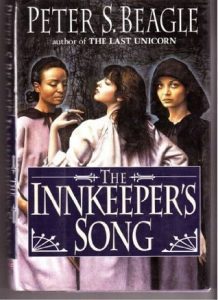
11. War for the Oaks by Bull
12. Paladin by Cherryh
13. Sorcerer to the Crown by Cho
14. Jonathon Strange and Mr. Norrell by Clarke
15. The Graveyard Book by Gaiman
16. A Tale of Time City by Diana Wynne Jones
17. Power of Three by DWJ
18. Dogsbody by DWJ
19. Arthur’s Goon by DWJ
20. Tigana by Guy Gavriel Kay
21. A Song for Arbonne by GGK
22. The Lions of Al-Rassan by GGK
23. Under Heaven by GGK
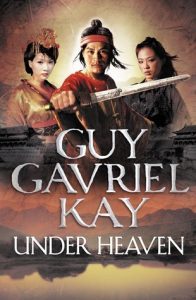
24. Children of the Earth and Sky by, yes, still GGK
25. Archivist Wasp by Korner-Stace
26. The Privilege of the Sword by Kushner
27. The Gray Horse by MacAvoy
28. The Moon and the Sun by MacIntyre
29. The Forgotten Beasts of Eld by Patricia McKillip
30. The Book of Atrix Wolfe by McKillip
31. The Changeling Sea by McKillip
32. Ombria in Shadow by McKillip
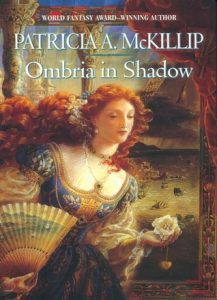
33. Alphabet of Thorns by, yes, McKillip; I know, right? I could list a whole bunch more of hers, but let’s move one:
34. Deerskin by Robin McKinley
35. Sunshine by McKinley
36. The City and the City by Mieville
37. The City in the Lake by Neumeier
38. The Keeper of the Mist by Neumeier
39. The Mountain of Kept Memory by Neumeier (I know it’s not out yet, but hey, November’s not so very far away anymore)
40. The White Road of the Moon by Neumeier (ditto, although I grant that March 2017 still seems fairly distant even to me)
41. The Folding Knife by KJ Parker
42. The Anubis Gates by Tim Powers
43. On Stranger Tides by Tim Powers
44. Bone Gap by Ruby
45. Elantris by Sanderson
46. The Shape-Changer’s Wife by Shinn
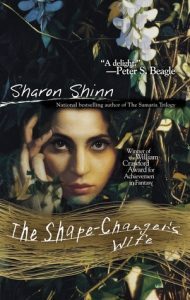
47. Scorpio Races by Stiefvater
48. Lord of the Two Lands by Tarr
49. Among Others by Walton
50. Sister Light Sister Dark by Yolan
There. Honestly, I don’t think that took more than ten, maybe twenty minutes. I just went and gazed at my bookshelves and scribbled down names – I didn’t even have to turn on my Kindle.
Okay, what screamingly obvious standalone fantasy titles did I miss? I’m sure there are another fifty titles that ought to be included on this kind of list, so drop a couple in the comments if any occur to you.

July 8, 2016
A first look at a dozen new arrivals
So, let me share with you some of the most recent acquisitions to my TBR pile. Here I’m not distinguishing between full books and samples, just opening up twelve of the newest books to arrive on my Kindle / at my house. They’re certainly stacking up, I must say. I have 38 samples now, plus 146 books on the virtual TBR pile, plus three and a half shelves of physical books on the real TBR shelves (there are only three shelves; the rest of those are piled on the floor). Who knows how long it’ll be until I finally get to any particular title?
Still, let’s take a look at them:
1. MIRAGE by Louise Cooper
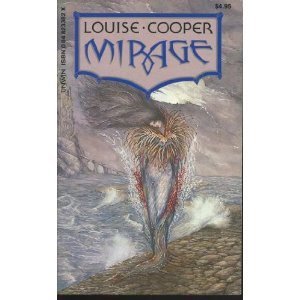
Are you awake, in the dark and the silence?
Do you have eyes to see, and ears to hear? Do you have hands to reach out and clutch at the emptiness?
Can you feel? Can you know hate, loneliness, love, despair?
Yes: you are alive. You can sense blood trickling through your veins, count the muffled beats of your heart; and you know that, after what might have been centuries of waiting, sleeping without dreams, without memory or identity, you exist. And although as yet there is nothing for your awakening senses to grasp, something is approaching you It draws nearer, like a half-recalled nightmare, and it pulls and calls, demanding that the call be heeded.
Evocative! Does the second person work for you here? That continues for about a page, so you can consider this a prologue, though it isn’t set aside with that word – probably wise, since many readers think they’re allergic to prologues and won’t touch them.
2. TOO LIKE THE LIGHTNING by Ada Palmer
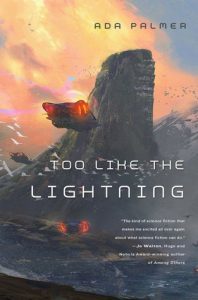
You will criticize me, reader, for writing in a style six hundred years removed from the events I describe, but you came to me for explanation of those days of transformation which left your world the world lit is, and since it was the philosophy of the Eighteenth Century, heavy with optimism and ambition, whose abrupt revival birthed the recent revolution, so it is only in the language of the Enlightenment, rich with opinion and sentiment, that those days can be described. You must forgive me my ‘thee’s and thou’s and ‘he’s and ‘she’s, my lack of modern words and modern objectivity. It will be hard at first, but whether you are my contemporary stil awed by the new order, or a historian gazing back at my Twenty-Fifth Century as remotely as I gaze back on the Eighteenth, you will find yourself more fluent in the language of the past than you imagined; we all are.
Daring! That first sentence is 82 words long. I’ve seen various reviewers just raving about this recently released title, and I’m betting it’s on a lot of award shortlists next year.
3. THE SPYMASTER’S LADY by Joanna Bourne
She was willing to die, of course, but she had not planned to do it so soon, or in such a prolonged and uncomfortable fashion, or at the hands of her own countrymen.
Catchy! Is there anyone who wouldn’t read the second sentence? Yes? Anybody? I didn’t think so.
4. EVERY HEART A DOORWAY by Seanan MacGuire
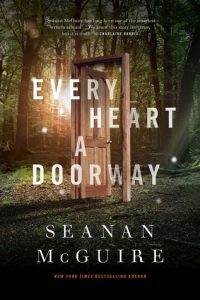
The girls were never present for the entrance interviews. Only their parents, their guardians, their confused siblings, who wanted so much to help them but didn’t know how. It would have been too hard on the prospective students to sit there and listen as the people they loved most in all the world – all this world, at least – dismissed their memories as delusions, their experiences as fantasy, their lives as some intractable illness.
Promising! Everyone seems to love this book, so, I picked it up when there was a Kindle daily deal or some such sale. I admit with a little trepidation. I loved FEED, but I had major reservations concerning various plausibility issue with the plotting. I thoroughly disliked DISCOUNT ARMAGEDDON, though probably part of that was because I listened to the audiobook and audio format magnifies flaws out of all proportion, imo. Well, we’ll see. Also, let me add that this is much shorter than I expected, either a novella or close, just FYI.
5. ROSES AND ROT by Kat Howard
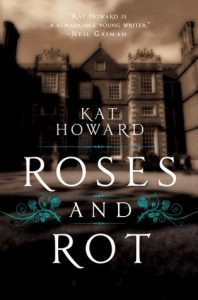
Marin sat on my bed, next to my half-packed suitcase. “I wish you weren’t leaving, Imogen.”
I couldn’t say the same, not and answer honestly. “I’d be leaving for college in two years anyway.”
“Yes, but that’s two years from now.” She picked through my t-shirts, separated one with a rose embroidered in tattered ribbon on its front from the pile. “This is mine, by the way.”
“Sorry, forgot,” I said. I took her hand, rubbed my thumb over her fading scars. Mine hadn’t healed as well, which had been the point.
Slow. Honestly, there’s nothing in this that particularly makes me want to turn the page. However, I would certainly go on with the story because many people seem to just love this book.
6. A NET OF DAWN AND BONES by C Chancy
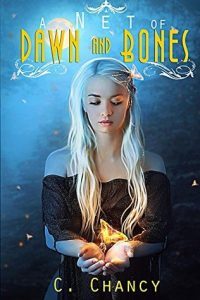
Darkness, illumined only by the seeping red glow of magma cracks below, the shimmer of ice falling over black cliffs to rumble and hiss into the spreading lava plain. The creak of rock and ice to steam and the wailing souls caught between them wove a net of agony that covered the world, shrouding one small cove of silence.
“… In nomine Patris, et Filii –”
“I cannot believe you still pray, after all these years.”
“… Et Spiritus Sancti, amen.” The spirit in the form of a young woman glanced up, certain of what she would see. And therefore worried.
Intriguing! That net of agony stuff is a bit off-putting. But given our recent discussions about religion in SFF, I would definitely go on.
7. WINGS OF FIRE by Tui Sutherland
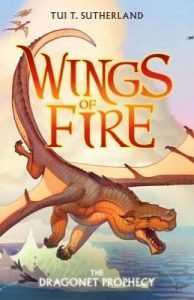
A dragon was trying to hide in the storm.
Lightning flickered across the dark clouds. Hvitur clutched his fragile cargo closer. If he could make it over the mountains, he’d be safe. He’d escaped the sky dragons’ palace unseen. And the secret cave was so close . . .
But his theft had not been as stealthy as he’d thought, and eyes as black as obsidian were already tracking him from below.
Dragons! This is a middle-grade story, part of a series, featuring dragons as the characters (no humans, just dragons). Quite a lot of MG fiction reads too young for me, but I thought I’d give this a try because, you know, dragons. I will say, it’s got great drawings. MG authors certainly do get all the cool illustrations.
8. VULCAN’S KITTENS by Cedar Sanderson

Linnaea looked out the tiny window of the tiny plane and marveled at the mountains below. They had flown out of the Boise airport just a half hour before, but already she could see few signs of civilization. Her trip had started that morning in the Seattle airport. She leaned her head against the cool window glass and relived the earlier scene with her mother.
Another slower start. After this, we get at least several paragraphs of backstory dropped on us. Well, we’ll see.
9. A LONG TIME UNTIL NOW by Michael Z Williamson
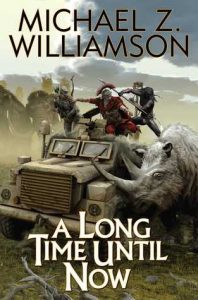
First Lieutenant Sean Elliott sat sweating in an MRAP in the ass end of Afghanistan, waiting for the convoy to roll.
Time travel! I know you can’t tell from this sentence, but I got this sample because I saw a description someplace – something about how military units from all kinds of times and places wind up back in . . . the Pleistocene? I don’t remember; some earlier epoch, anyway. That just sounds like it might be a whole lot of fun. I’ve never read anything by Williamson as far as I remember; I must say, the sample function is super-handy for risk-free browsing of titles that catch your eye.
10. IRONA 700 by Dave Duncan
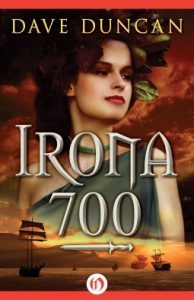
“I’m not going,” she said. “It’s a waste of time.”
Crammed in, shoulder to shoulder around the tiny table, her brother fed like starving sharks and did not meet her eye. Her father continued to chew, staring at the gap in the wall above her where a rotten plank had fallen out. He kept promising to mend it.
“We’d just walk until our feet hurt and then have to walk all the way back again!” This time Irona glanced over to the bed, where her mother sat, nursing the latest baby and surrounded by Irona’s sisters, all waiting their turn at the food.
Gritty. Not a setting I much care for, but then I expect Irona is shortly going to be leaving this difficult family situation.
11. AURORA by Kim Stanley Robinson
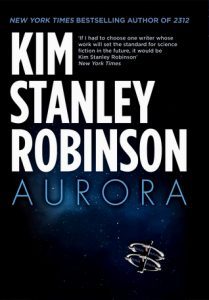
Freya and her father go sailing. Their new home is in an apartment building that overlooks a dock on the bay at the west end of Long Pond. The dock has a bunch of little sailboats people can take out, and an onshore wind blows hard almost every afternoon. “That must be why they call this town the Fetch,” Badim says as they walk down to take out one of these boats. “We always catch the brunt of the afternoon wind over the lake.”
So after they’ve checked out a boat, they have to push it straight off the side of the dock into the win, Badim jumping in at the last moment, hauling the sail tight until the boat tilts, then aiming it toward the little corniche around the curve of the lakeshore.
Startling! SF, really? This is a surprising way to start this novel. Also, present tense? That’s kind of a departure for KSR, isn’t it? Well, it’s interesting, though I wouldn’t have expected it.
12. DRINKING GOURD by Barbara Hambly
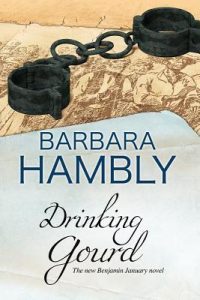
“Well now, Mr Tambo,” drawled the Interlocutor, as the row of black-painted white men cased their spirited rendition of ‘The Bee-Gum Tree’ on banjos and bones and the little backing orchestra – a dark tableau against the painted backdrop, in the mild light that filtered through the canvas walls of the show tent – softened to a gentle plunking like the beat of a sleeping heart. “How are you at mathematics?”
Unexpected! Anybody see that line about mathematics coming? Actually, the first lines of this particular book don’t matter much to me; this is the latest Benjamin January novel and so of course I’ll be reading it soon. I don’t like every single installment in this series equally, but overall it’s my favorite mystery series out there, so I’m really pleased Hambly is still going on with it. This one sounds promising if you read the back cover copy. I had to google “drinking gourd underground railroad” to get the title, though. Did any of you get the reference without google?

July 7, 2016
Taking Book Recommendations on Faith
Lately, it strikes me, I’ve read primarily books that I would never have picked up without a hearty shove from a friend or from a blogger whose taste I trust. These include:
Sunbolt by Intisar Khanani
Peas and Carrots by Tanita Davis
Persona by Genevieve Valentine
How about that for variety? The first is a short little fantasy, almost a novella; the second is a contemporary YA, and the third is a near-future politics-heavy SF novel.
Why I read Sunbolt: a personal friend send me a YOU MUST READ THIS text about, not this book, but the sequel. Well, all right, then. I’d never heard of this author, but sure. And then once it was on my Kindle, well, a short book was just right when Ish and I were recently stuck at the emergency clinic for four hours.
So, Sunbolt was not a story I fell hard for, but I did like it and I’m curious about the sequel, especially given that text from my friend.
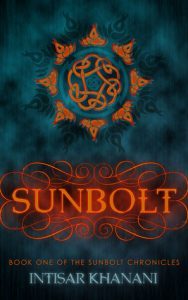
The story involves a young thief who involves herself with a political conspiracy, gets caught, escapes with the help of a scary soul-stealing vampire with whom she’s imprisoned, and is then seriously affected when, in desperation, she throws a large amount of magic around without being trained to handle it. There, I think that’s pretty accurate without dealing in too many spoilers.
Anyway, the heart of this story reminded me very strongly of McKinley’s Sunshine, and it would be rather unlikely for any book to measure up to that one, so Khanani’s can’t help but suffer by comparison. Of course Sunbolt is very different in many, many ways; the world is not the same at all and naturally the plot goes off in its own direction. It’s a decent read and, as I say, I’m curious about the sequel.
Now, Peas and Carrots.
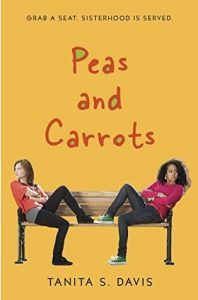
I fear that for me, this title is an active turn-off. I get that it means, “As different as…” But I still think it’s a stupid-sounding title. As you all know, I don’t read a whole lot of contemporary YA, and I certainly wouldn’t have looked twice at this one just based on its title and cover. Not that there’s anything wrong with the cover, but it is so plainly a contemporary YA. But I’m perfectly willing to pick up an otherwise unappealing book when certain bloggers recommend it – particularly though not exclusively Maureen at By Singing Light and Brandy at Random Musings. Click on the links to check out their reviews of Peas and Carrots.
This is a story where Dess, a white teenager caught up in the foster care system, goes to stay with the black family that’s been fostering her mixed-race baby brother. There’s a lot of embedded issues in a situation like that, obviously, and in less deft hands you can see how it would turn into a preachy message-fic kind of story. Davis almost completely avoids that, mostly by drawing her characters really well, both the protagonists and the secondary characters; and also by keeping a tight focus on the specific, individual concerns of her two protagonists. Dess is dealing with a pretty difficult background, lingering PTSD, and hard-held mistrust of everyone. Hope, who is about her age, is dealing with a new foster sister who is admittedly pretty difficult at first. Theirs is the central relationship in the story, which is told from their alternating points of view.
I didn’t really care for this story until the two girls kind of worked out their relationship. I liked them both and wanted them to be friends. Of course I knew that was going to happen, so I was patient. Once it did, I liked the book a whole lot better. Both Dess and Hope are really so well drawn, and so are Hope’s parents – and Dess’ mother, too, actually, though we see her parents only in absentia, which requires a whole extra layer of deft, doesn’t it, to pull that off. The whole story is really about family, and the details and voices in this story are so beautifully handled that all the family relationships feel completely real. It’s hard to believe these people aren’t all real and living in some nearby town. I got pretty invested, I must say, and would gladly read a sequel. Personally I think Dess was essentially hallucinating the biker gang members, but Davis never makes this clear – an ambiguity I really like – but in a sequel, I expect we would find out.
Okay, now, Persona is nothing like either of the above.
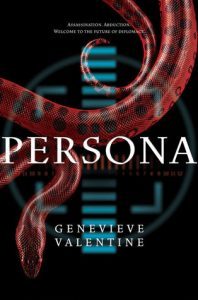
Oh, I get the snake on the cover now. I’d forgotten about that. This is not at all horror, btw, so if that’s the vibe the snake gives you, no. I like snakes, so I don’t have that impression personally; and incidentally a great snake identification blog I just happened across is Living Alongside Wildlife in case you’d like to check that out.
But back to Persona. I really didn’t like the sample, which presented a protagonist who didn’t appeal to me in a situation that appealed to me even less. But Maureen persisted in commenting about her love for this book, so when it appeared at a sale price, I picked it up and eventually (with some trepidation) went on with it just to get it off my TBR pile. Leaving The Girls at the Kingfisher Club just sitting, even though I really look forward to reading that one. It’s odd how you may reach for a book you don’t really expect to like long before one you anticipate loving, just to get it out of the way. Or is that just me?
Anyway, I wound up really enjoying Persona — and admiring the writing a great deal. I would definitely have thought about nominating it for awards this year if I’d read it earlier – I don’t think it would have bumped anything that I did nominate, but I would have considered it. I admire the adroit way Genevieve Valentine moves back and forth in time to build in her protagonists’ personal stories while also moving forward with the actual plot. I admire the subtlety of the writing, and the intensity, and the way the world closes around you claustrophobically as you read the novel . . . and that’s why I would probably not have wound up nominating it. That claustrophobic feeling.
It’s a triumph of storytelling that I genuinely enjoyed Persona, because ordinarily a claustrophobic setting makes me pull away and maintain an emotional distance from the story. In this one, the protagonists – and most of the other characters – are so tightly closed in by their circumstances; honestly, it’s unbearable to imagine living that way. Practically every move they make and word they utter is witnessed by an audience, and there’s betrayal on every side and (almost) no one you can trust. The whole idea just makes my skin crawl. Also, celebrity pop culture is simply not something I get. If I lived in that world, I would be oblivious to the Faces and baffled by the fascination they exert on everyone else, just as I’m oblivious to and baffled by celebrities today.
On the other hand, I really love Suyana and Daniel. Plus this book is such a great example of how you can have high and rising tension with relatively little action. It’s an intense reading experience, not something to pick up lightly and read casually. But after finishing Persona, I immediately picked up the just-released sequel, Icon. The first book was pretty well self-contained, but I am eager to see how Suyana meets the new challenges she faces. Also, I would like to see Margot go down.

July 6, 2016
Endeavor Award finalists
Via File 770, a short list I can really get behind: The Endeavor Award — a Pacific NW regional award — finalists are —
Price of Valor by Django Wexler
Tracker by CJC
Silver on the Road by Laura Anne Gilman
and also
Edge of Dark by Brenda Cooper
Irona 700 by Dave Duncan
I am substantially more likely to look at the last two because of the upper three. It says in the post, “All entries are read and scored by seven readers randomly selected from a panel of preliminary readers.” So, good for those readers! Excellent taste! The judges, selected from professional writers outside the Pacific Northwest, are, this year, Jack McDevitt, Michaela Roessner, and Gordon Van Gelder.
Good luck to the finalists and I’m stumped thinking which of those upper three I’d pick — and like I said, I’m now inclined to look at the others, too.




